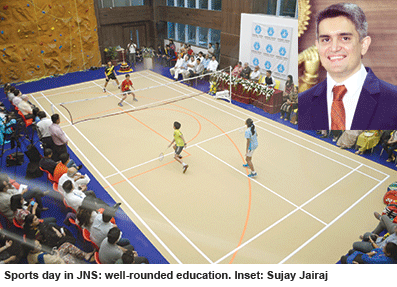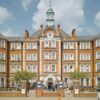Jamnabai Narsee School, Mumbai
Its focus on holistic education — Jamnabai Narsee School is ranked among the country’s Top 10 co-ed day schools and #3 in Mumbai — has won it the patronage of Mumbai’s cognoscenti – Dipta Joshi
 Located in Mumbai’s tony JVPD Scheme area — a favoured address of Bollywood stars — over the past half century, Jamnabai Narsee School (JNS, estb. 1971) has emerged as one of the commercial capital’s most preferred day schools. This K-12 school, currently celebrating its 45th anniversary, is ranked among the Top 10 co-ed day schools countrywide and #3 in Mumbai in the EducationWorld India School Rankings (EWISR) 2015. Its focus on holistic education — Jamnabai Narsee School is ranked among the Top 10 day schools countrywide on the parameters of academic reputation, competence of faculty, life skills and co-curricular education — has won it the patronage of Mumbai’s cognoscenti.
Located in Mumbai’s tony JVPD Scheme area — a favoured address of Bollywood stars — over the past half century, Jamnabai Narsee School (JNS, estb. 1971) has emerged as one of the commercial capital’s most preferred day schools. This K-12 school, currently celebrating its 45th anniversary, is ranked among the Top 10 co-ed day schools countrywide and #3 in Mumbai in the EducationWorld India School Rankings (EWISR) 2015. Its focus on holistic education — Jamnabai Narsee School is ranked among the Top 10 day schools countrywide on the parameters of academic reputation, competence of faculty, life skills and co-curricular education — has won it the patronage of Mumbai’s cognoscenti.
Promoted by the Narsee Monjee Educational Trust (NMET), JNS is affiliated with Delhi-based Council for the Indian School Certificate Examinations (CISCE) and the National Institute of Open Schooling (NIOS). In response to community demand for international certification, in 2004 the trust also promoted the Jamnabai Narsee International School (JNIS) which offers the IGCSE (class X) curriculum of Cambridge International Examinations, UK and the IB Diploma Programme (class XI-XII) of the International Baccalaureate Organisation, Geneva.
Moreover, last July, JNIS introduced IBO’s primary years programme (PYP) and middle years programme (MYP). Though the two schools are differentiated for administrative purposes, students share infrastructure and other facilities spread over the 200,000 sq. ft campus. Currently, the two schools boast an aggregate enrolment of 4,900 students mentored by 350 teachers.
“The school’s founders — Chatrabhuj Narsee, Pratap Narsee and Dharamshi Narsee who named the institution after their mother Jamnabai — set high benchmarks not only for academics and infrastructure but also for extra-curricular and sports education. Over the years, the school has built upon this broad vision and developed and upgraded pedagogies and facilities to ensure that every student receives high-quality education enabled by excellent academics, sports and arts facilities,” says Sujay Jairaj, an NMET trustee whose grandfather was one of the founding fathers of the school. Jairaj is also vice president of Golden Chemicals Pvt. Ltd.
The management’s emphasis on well-rounded education and provision of enabling state-of-the-art infrastructure has paid rich academic dividends. In 2015, of the 274 students who wrote the class X (ICSE) exam, 146 scored 90 percent-plus while in the class XII (ISC) exam, 87 students (out of 150) averaged above 90 percent. In the IGCSE (class X) exam conducted by CIE (UK), 18 students (out of the 62) scored 90 percent-plus. Similarly, of the 100 students who wrote the IB diploma exam last year, three recorded a score of 44 grade points (out of a maximum possible 45). Unsurprisingly, JNS school-leavers are welcomed by the world’s top universities including Pennsylvania, Columbia, Yale, Johns Hopkins and London School of Economics, among others.
According to Zeenat Bhojabhoy, principal of JNS, a distinguishing feature of the school is its focused attention to teacher training and development. “Our 350 teachers attend an annual three-week professional development workshop and in-service teacher enrichment programmes to upgrade their subject knowledge and skills as well as emotional and spiritual quotients. This constant focus on developing teacher skills and competence has not only enhanced our students’ academic performance but also developed their life and social skills,” says Bhojabhoy, an alumna of Mumbai University who taught at Activity Infant School and Jamnabai Narsee School before being promoted to principal in April 2015.
Another USP of the school is the heavy investment the management has made in developing its infrastructure and campus. The three interconnected, six-storeyed buildings house 150 hexagonal classrooms designed for natural ventilation and light. Every floor boasts foyers in which students present multimedia programmes and creative work. Academic support is provided by three libraries housing 50,000 volumes, six science laboratories, three computer labs and a resource centre for remedial teaching.
Co-curricular options are extensive with six music and dance rooms, a recording studio, two art rooms, a fashion design studio, a tailoring unit, an amphitheater, auditorium, and a convention centre. Other facilities include three cafeterias, a stationery store, and a well-equipped healthcare facility.
Sports education also receives equal attention. JNS is one of the few schools in land-starved Mumbai to provide students with three sports courts (basketball, tennis and multi-purpose), indoor sports facilities, a 30 ft. rock climbing wall and outdoor play area on campus. In addition, the school enjoys access to an open municipal playground next door.
“We have spared no expense to provide the best academic and sports facilities to our JNS and JNIS students. This has enabled them to win laurels in inter-school football tournaments, regional and national debates and The International Award for Young People,” says Jairaj.
Surprisingly, despite JNS receiving golden opinions, the Narsee Monjee Educational Trust hasn’t promoted affiliated schools in Mumbai. However, last year NMET inaugurated a new Jamnabai Narsee School at the Gujarat International Finance Tec City, near Gandhinagar, the capital of Gujarat. “JNS, Mumbai is a purely charitable institution and not a business proposition. So we would rather focus on new pedagogies, academics and extra-curricular and sports facilities to ensure wholesome and ethical development of our children,” says Jairaj.
| Admission & Fees
Jamnabai Narsee School is a K-12 co-educational day school offering the curriculums of the Delhi-based CISCE and the National Institute of Open Schooling while the Jamnabai Narsee International School is affiliated with CIE, UK and IBO, Geneva. Admission forms for entry into the nursery school are usually issued in December. |
















Add comment